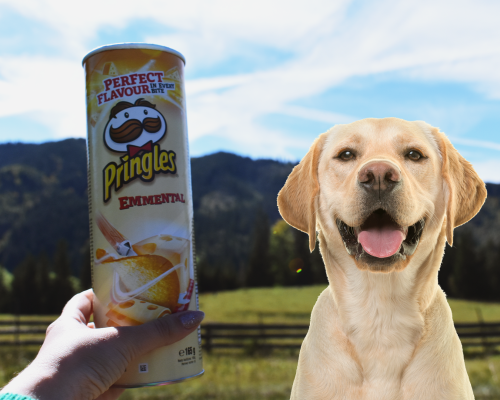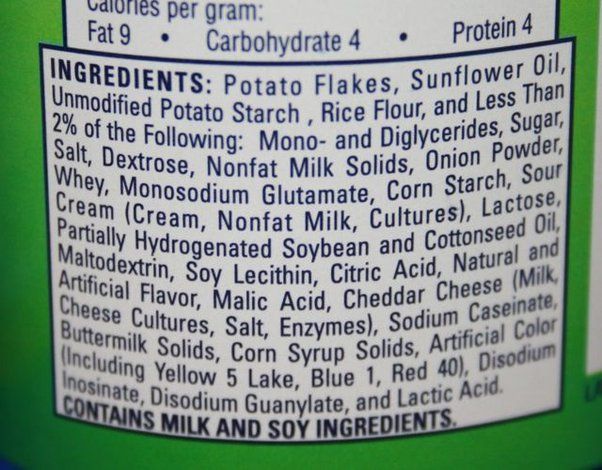Can dogs Eat Pringles? Vet Checked
Can dogs Eat Pringles? Vet Checked

Vet Reviewed

By: Sarah Hodgson
January 1, 1970
- Posted in Dogs
Table of Contents
To start off with, we humans enjoy pringles, and sometimes it's hard to resist those pleading eyes from our four-legged friends. So is it safe to feed them pringles? Perhaps one chip won't hurt. In this article, we dive into the risks and harms of feeding Pringles to dogs and discuss safe alternatives to keep our furry friends happy and healthy.
So let's dive in!
Can Dogs Eat Pringles?
Let's start off with the answer before we dive into the techinal parts. While it may be tempting to share your Pringles with your dog, it's important to consider the ingredients and potential risks involved. Pringles are loaded with salt, artificial flavors, preservatives, and other additives that can be harmful to dogs. These ingredients can lead to various health issues, including gastrointestinal upset, dehydration, and even kidney damage. It's best to avoid feeding Pringles to dogs altogether.
Ingredients in Pringles and Their Potential Harm to Dogs

Let's take a closer look at the ingredients found in Pringles and understand why they can be harmful to our canine friends.
- Salt: Pringles are notorious for their high salt content. While we may enjoy the salty taste, excessive salt intake can lead to sodium ion poisoning in dogs. Symptoms may include vomiting, diarrhea, excessive thirst, and even seizures.
- Artificial Flavors and Preservatives: Pringles are loaded with artificial flavors and preservatives to enhance their taste and extend their shelf life. These additives can cause allergic reactions, digestive issues, and contribute to long-term health problems in dogs.
- Onion and Garlic Powders: Pringles often contain onion and garlic powders, which are toxic to dogs. These ingredients can damage a dog's red blood cells, leading to anemia and other serious health complications.
- Fat and Oil: Pringles are fried in oil, which can be detrimental to a dog's health. Excessive fat intake can lead to obesity, pancreatitis, and other conditions that can shorten a dog's lifespan.
Risks and Potential Dangers of Feeding Pringles to Dogs
Feeding Pringles to your dog may seem harmless, but the risks and potential dangers should not be underestimated. Here are some reasons why you should avoid giving Pringles to your furry friend:
- Gastrointestinal Upset: The high salt content and artificial additives in Pringles can upset a dog's stomach, leading to vomiting, diarrhea, and discomfort.
- Dehydration: Consuming salty snacks like Pringles can cause excessive thirst in dogs, leading to dehydration. This can be especially dangerous for dogs with underlying health conditions or those who are prone to urinary issues.
- Kidney Damage: The kidneys play a vital role in filtering out toxins from the body. Excessive salt intake from Pringles can put a strain on a dog's kidneys and potentially lead to kidney damage or failure.
- Weight Gain and Obesity: Pringles are a calorie-dense snack, and regular consumption can contribute to weight gain and obesity in dogs. This can lead to various health issues, including joint problems, heart disease, and diabetes.
Safe Alternatives to Pringles for Dogs
While Pringles may be off the menu for our furry friends, there are plenty of safe and healthy alternatives that dogs can enjoy. Here are a few options to consider:
- Fresh Fruits and Vegetables: Dogs can benefit from the vitamins and minerals found in fresh fruits and vegetables. Offer your dog slices of apple, carrot sticks, or even frozen blueberries as a crunchy and nutritious snack.
- Homemade Dog Treats: Get creative in the kitchen and bake homemade dog treats using dog-friendly ingredients. There are countless recipes available online that cater specifically to canine taste buds.
- Commercial Dog Treats: Opt for high-quality, dog-approved treats that are specifically formulated for canine consumption. These treats are often made with natural ingredients and are free from harmful additives.
- Kibble or Wet Food: If your dog enjoys the crunchiness of Pringles, consider offering them a high-quality kibble or dental chew specifically designed to promote dental health. Wet food can also be a tasty and nutritious alternative.
The Bottom Line
So there you have it, while it may be tempting to share some tasty pringles with your dog, it's vital to prioritize their health and well-being. Pringles, with their high salt content, artificial flavors, and preservatives, can be harmful to dogs and should be avoided. Instead, opt for safe alternatives like fresh fruits, homemade treats, or commercial dog-approved snacks. By making informed choices, we can ensure that our four-legged friends lead a happy and healthy life.
Remember, always consult with your veterinarian before introducing any new foods to your dog's diet.

Subscribe to Petfluence!
Get updates on the latest posts and more from Petfluence straight to your inbox.